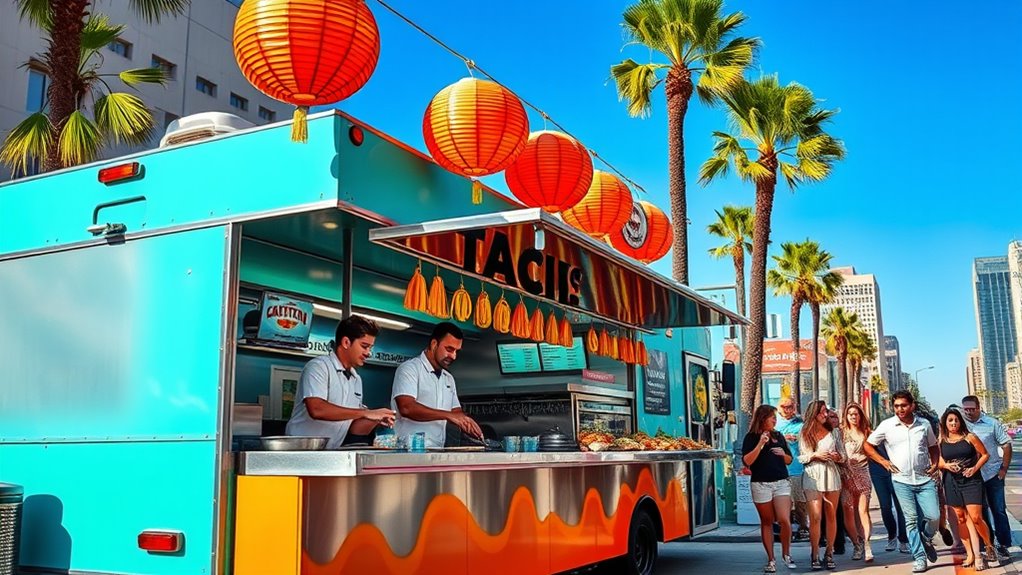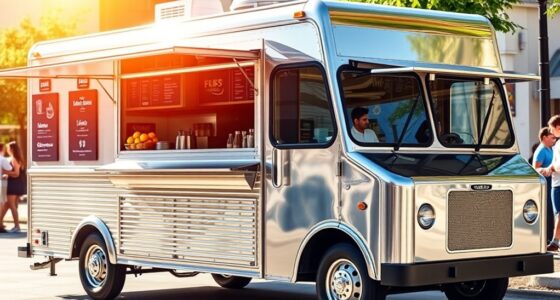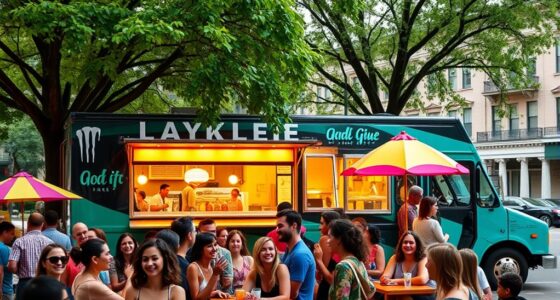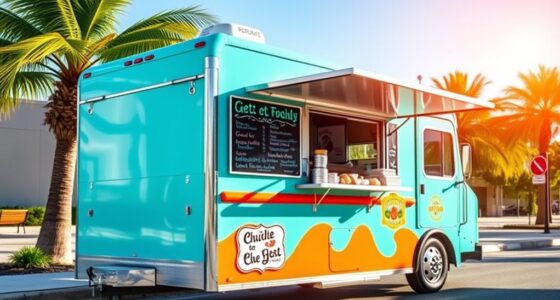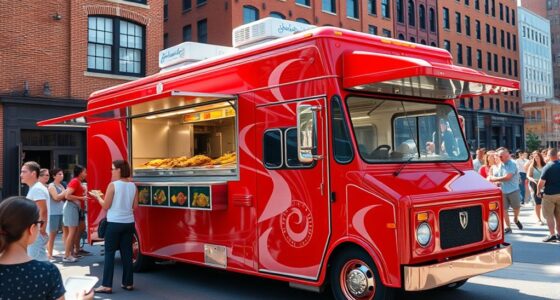To start a food truck in Stockton, CA, you need to understand local regulations, secure the necessary permits, and choose a strategic vending zone within the city. Building strong community connections, engaging in local events, and focusing on a unique, locally inspired menu will boost your visibility. Budget wisely, explore funding options, and invest in reliable insurance. Focusing on operations, marketing, and community ties will help you succeed—continue, and you’ll discover the full roadmap to launching your food truck today.
Key Takeaways
- Understand Stockton’s local food scene, regulations, and designated vending zones to ensure compliance and community engagement.
- Develop a strong brand, menu tailored to community preferences, and utilize social media for marketing and customer loyalty.
- Secure necessary permits and licenses through the online portal, adhering to sanitation and safety standards.
- Obtain funding via SBA loans or microloans, and acquire liability insurance to protect your business and meet legal requirements.
- Plan operational logistics, including kitchen setup, vehicle purchase, and cost management for a smooth launch.
Navigating Stockton’s Food Scene
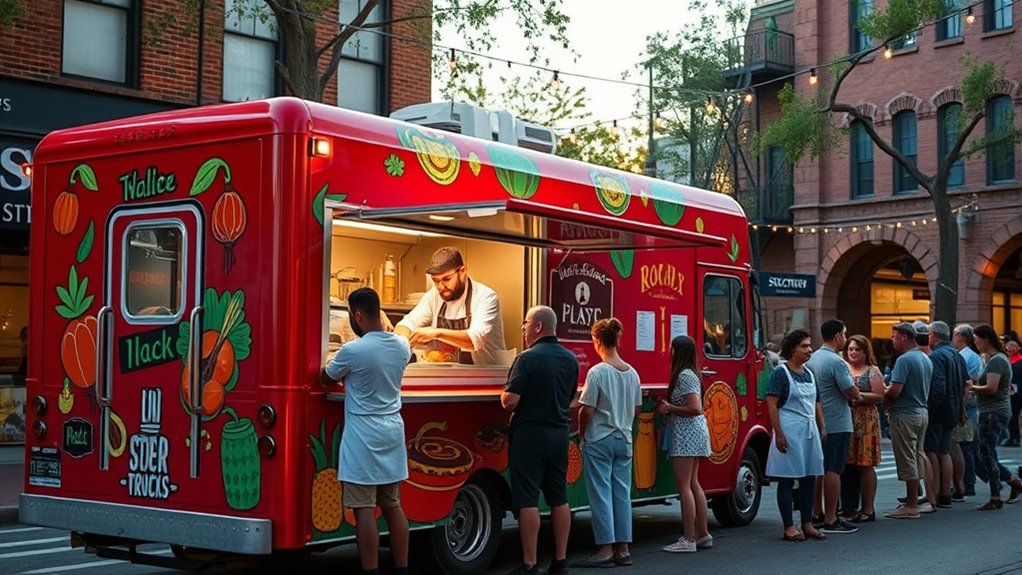
To successfully start a food truck in Stockton, you need to understand the local food scene. Building strong food truck branding is essential to stand out among competitors and attract your target audience. Focus on creating a memorable logo, catchy name, and cohesive visuals that resonate with Stockton’s diverse community. Social media engagement plays a crucial role in connecting with potential customers, promoting daily specials, and sharing your story. Use platforms like Instagram and Facebook to post appealing photos, interact with followers, and generate buzz around your truck. Pay attention to local food trends and preferences, and tailor your menu accordingly. By combining effective branding and active social media presence, you’ll establish a solid foothold in Stockton’s vibrant food scene. Celebrating the art of storytelling through your marketing efforts can help foster a loyal customer base and elevate your brand.
Understanding Local Requirements
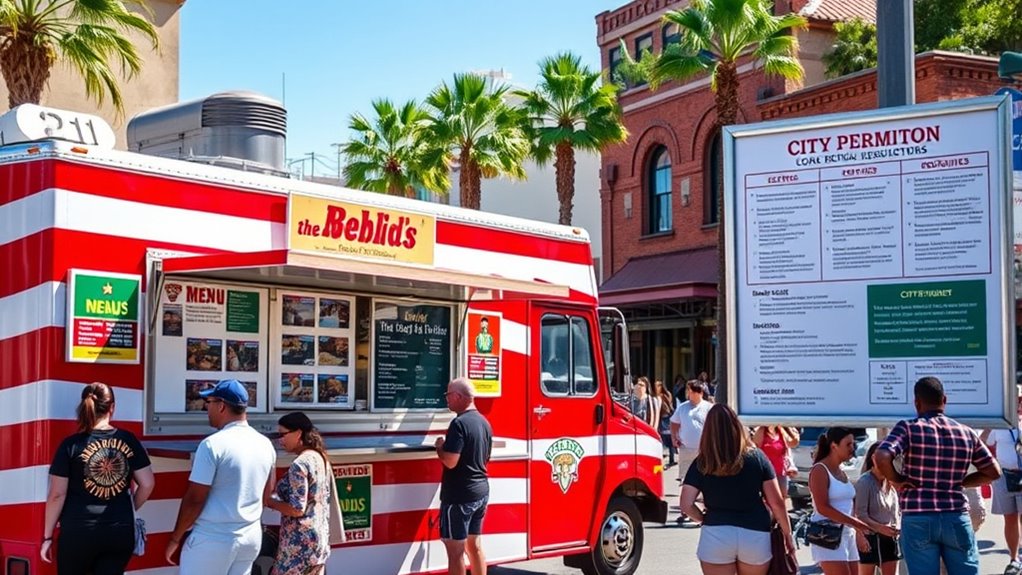
To get your food truck up and running, you’ll need to use the online permit application portal to submit your paperwork and guarantee you meet sanitation protocols. You should also familiarize yourself with designated street vending zones to stay compliant with local regulations. Understanding these requirements early helps you avoid delays and keeps your startup on track. Additionally, researching local hours of operation for nearby businesses can help you plan your vending schedule more effectively.
Online Permit Application Portal
Accessing the online permit application portal is a essential step in launching your food truck in Stockton, CA. This digital platform simplifies the process by allowing you to submit your online permit requests quickly and efficiently. When you visit the application portal, you’ll find clear instructions and required forms to complete your application. Make sure to review all guidelines before submitting, as missing information can delay approval. The portal also offers resources to help you understand local regulations and ensure your application meets Stockton’s specific requirements. Using the online permit application portal saves you time and provides a convenient way to track your application status. It’s a critical tool to help you get your food truck up and running smoothly in Stockton.
Sanitation Protocols and Paperwork
Once you’ve submitted your online permit application, it’s important to understand the specific sanitation protocols and paperwork required by Stockton. You’ll need to comply with local food safety regulations that emphasize proper cleaning procedures to prevent contamination. Stockton mandates regular cleaning of all food contact surfaces and equipment, with detailed records kept to demonstrate compliance. You may need to submit sanitation logs and proof of food safety training for yourself and staff. Additionally, ensure your food truck passes health inspections, which will review your cleaning procedures and overall hygiene practices. Staying up-to-date with these requirements helps avoid fines or permit issues. Familiarize yourself with local health codes and maintain meticulous documentation to keep your operation running smoothly and safely.
Designated Street Vending Zones
Understanding designated street vending zones in Stockton is essential for ensuring your food truck operates legally and smoothly. These zones are designated areas where vending is permitted under local regulations. To avoid fines or penalties, you need to familiarize yourself with parking regulations and secure the necessary vendor permits. Stockton often restricts vending to specific locations and times, so check local maps and signage carefully. Keep in mind that:
- Parking regulations specify where and when you can park your truck
- Vendor permits are required to operate legally within designated zones
- Some zones may have limits on the number of vendors or specific hours of operation
Adhering to these requirements helps prevent issues and ensures your food truck runs efficiently. Always stay updated with city announcements to remain compliant.
Setting Up Your Base of Operations
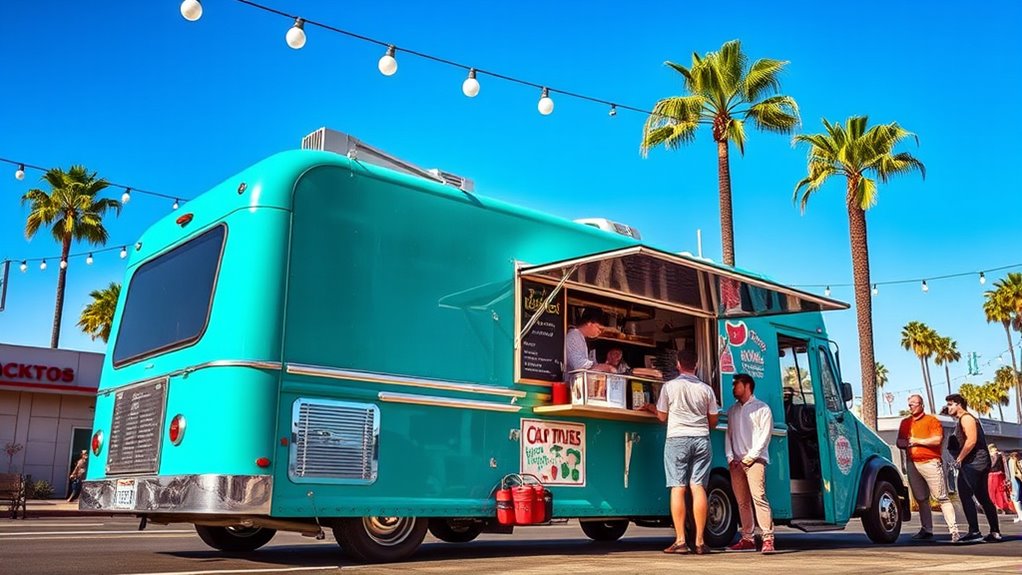
Choosing the right space is vital, so consider shared kitchen licensing options to save costs and meet health regulations. You’ll also want to plan a custom kitchen layout that maximizes efficiency and suits your menu. These steps help establish a solid foundation for your food truck operations. Incorporating traditional and modern butter making techniques into your kitchen design can inspire unique menu offerings and improve ingredient versatility.
Shared Kitchen Licensing Options
Setting up your food truck operation in Stockton often involves considering shared kitchen licenses, which can be a cost-effective and flexible option. These shared kitchen arrangements allow you to use existing commercial kitchens that hold valid permits, saving you time and money. With shared kitchen licensing, you don’t need to invest in building your own facility right away. Instead, you can rent space in approved kitchens that meet health and safety standards. This approach simplifies obtaining commercial kitchen permits, as the facility is already compliant. When exploring shared kitchens, look for options that offer:
- Flexible rental hours
- Certified, inspected facilities
- Access to necessary equipment
This setup streamlines your licensing process and helps you focus on growing your food truck business.
Custom Kitchen Layout Planning
Designing a custom kitchen layout is a crucial step in establishing a functional and efficient food truck operation. Proper layout planning ensures smooth workflow, safety, and quick service. Start by analyzing your menu and equipment needs, then arrange appliances and prep stations logically. Consider traffic flow to minimize congestion and cross-contamination. Use space wisely to maximize storage and workspace. Here’s a sample layout:
| Station | Purpose |
|---|---|
| Cooking Area | Grills, fryers, ovens |
| Prep Station | Chopping, assembling food |
| Refrigeration | Cold storage |
| Serving Window | Customer interface |
| Storage | Supplies and ingredients |
A well-designed custom kitchen boosts productivity, reduces errors, and keeps your operation running smoothly. Proper layout planning is essential for success.
Budgeting and Financing Your Food Truck
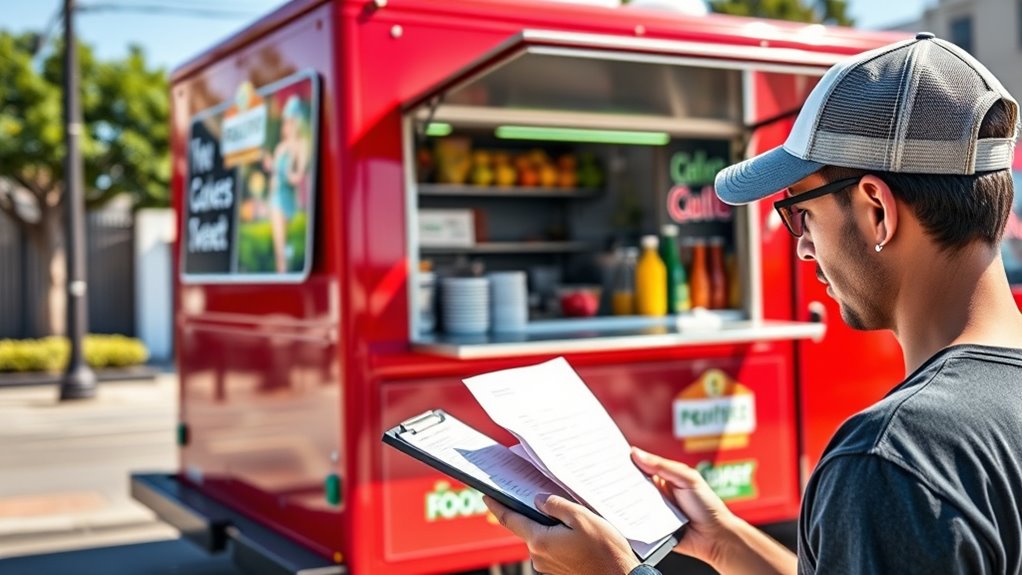
Before launching your food truck, you need to plan your budget carefully. Consider the costs of acquiring your vehicle, explore financing options like SBA loans, and understand the insurance requirements. Getting these basics right will set a strong foundation for your business. Additionally, understanding the best practices for equipment maintenance can help prevent costly repairs and ensure smooth operations in the long run.
Initial Vehicle Acquisition Expenses
Securing your food truck is a major upfront cost that requires careful budgeting and financing. You’ll need to contemplate expenses like vehicle financing, which can vary based on whether you buy new or used, and the terms of your loan. Additionally, truck customization is essential to meet health codes and your branding needs, influencing your total investment.
Key factors include:
- Choosing between leasing or buying your vehicle
- Budgeting for essential truck modifications and equipment
- Planning for additional costs like insurance and registration
Small Business Administration Loans
If you’re looking for a practical way to finance your food truck, Small Business Administration (SBA) loans can be a smart option. They often offer favorable terms and lower interest rates, making it easier to cover vehicle costs, equipment, and initial setup expenses. Keep in mind, you’ll need to allocate funds for food safety measures and securing vendor permits to operate legally. Here’s a quick overview of common SBA loan options:
| Loan Type | Purpose | Qualification Tip |
|---|---|---|
| 7(a) Loan | Equipment, working capital | Strong credit, solid business plan |
| CDC/504 Loan | Major assets like trucks | Good credit, collateral required |
| Microloan | Smaller expenses, supplies | Limited collateral, quick approval |
| Express Loan | Fast funding for startup costs | Good credit, clear financials |
Liability Insurance Requirements
When financing your food truck, budgeting for liability insurance is a key step to make certain you’re protected and compliant with local regulations. Ensuring insurance compliance and sufficient liability coverage helps prevent costly legal issues and protects your business assets. You’ll need to research different policies to find the right coverage for your specific operation. Consider these factors:
- Minimum liability coverage requirements set by Stockton, CA regulations.
- Options for extensive liability insurance to cover customer injuries and property damage.
- Additional coverage for equipment, inventory, and employee-related incidents.
Designing Your Menu and Pricing Strategy
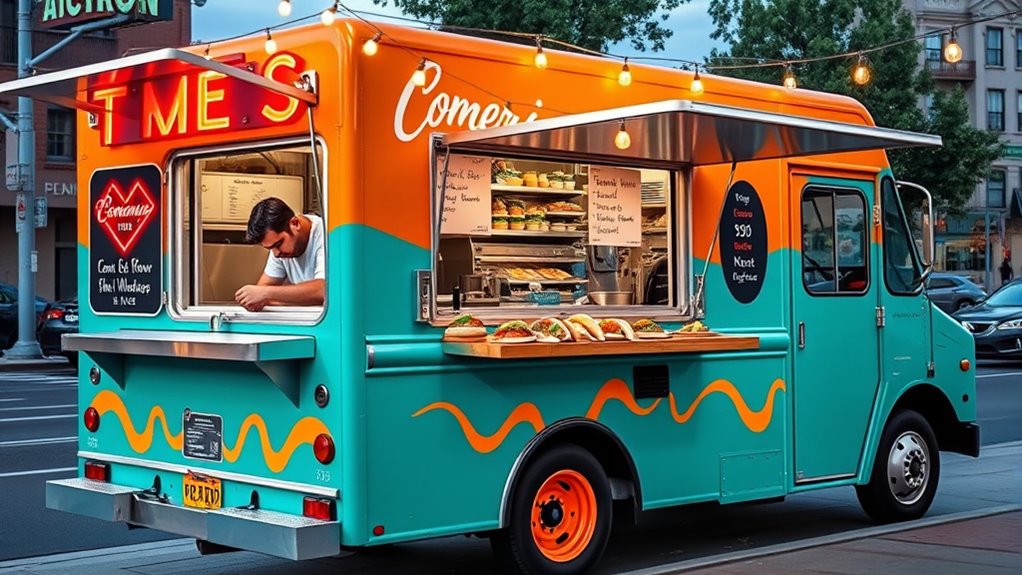
When designing your menu, focus on locally inspired dishes that resonate with Stockton’s community. Break down ingredient costs carefully to make sure your prices cover expenses and stay competitive. This approach helps you create appealing options while maintaining a profitable pricing strategy. Incorporating diverse designs in your food truck branding and presentation can also attract more customers and enhance your overall appeal.
Locally Inspired Dish Selection
To create a menu that resonates with Stockton’s vibrant community, focus on sourcing locally inspired ingredients and flavors that reflect the area’s culinary heritage. Your locally inspired dish selection should highlight Stockton’s agricultural roots and diverse culture, offering customers a memorable experience. Experiment with unique flavor combinations to stand out and keep your menu fresh. Consider incorporating local produce, seafood, or regional spices. Some ideas include:
- Fusion tacos with locally sourced vegetables and regional herbs
- Signature sandwiches featuring Stockton-grown meats and cheeses
- Creative bowls combining seasonal ingredients and bold sauces
Ingredient Cost Breakdown Techniques
Creating a menu that appeals to Stockton’s diverse culinary scene requires careful attention to ingredient costs and pricing strategies. To do this effectively, start with thorough ingredient sourcing. Know where to find quality ingredients at the best prices, whether from local markets or wholesale suppliers. Next, perform a detailed cost analysis for each dish by calculating the total ingredient costs and portion sizes. Break down these costs to determine the food cost percentage, which helps you set prices that ensure profitability while remaining competitive. Regularly review your ingredient sourcing options to identify savings and adjust menu prices accordingly. This technique keeps your food truck financially sustainable and allows you to offer appealing dishes without sacrificing quality or profit margins.
Technology and Operations
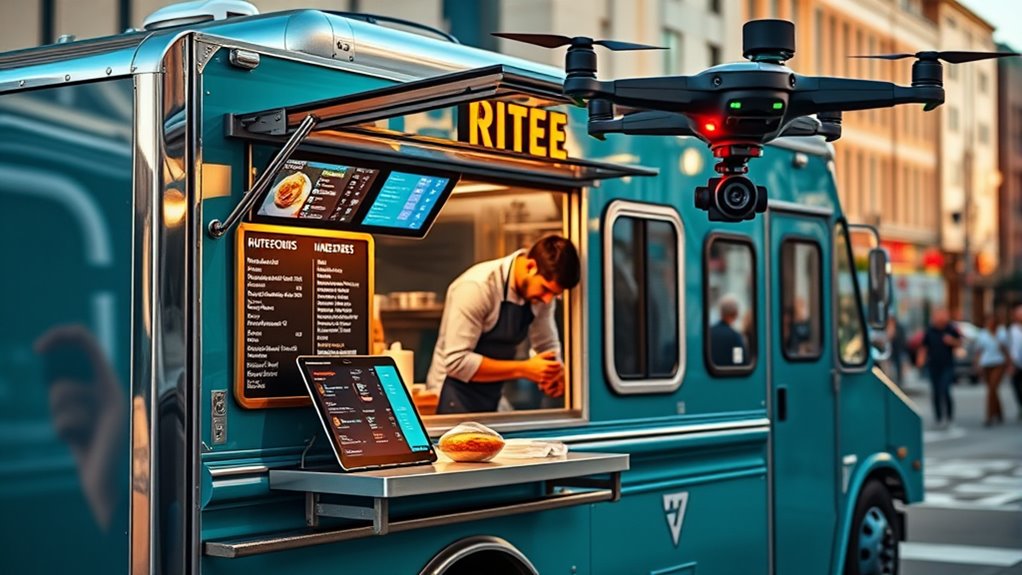
Implementing contactless payment options can speed up transactions and improve customer satisfaction. Integrating a mobile POS system makes managing orders and sales more efficient. Embracing these technologies helps keep your food truck competitive and operationally smooth.
Contactless Payment Options Available
Have you considered how contactless payment options can streamline your food truck operations? Implementing contactless payments makes transactions faster and safer, reducing the need for cash handling. Customers can pay effortlessly using digital wallets, which enhances their experience and encourages repeat business. You can also reduce errors and improve record-keeping by adopting these methods.
Some benefits include:
- Faster checkout times, minimizing lines
- Enhanced safety with touch-free transactions
- Increased convenience for customers using digital wallets
Mobile POS System Integration
Integrating a mobile POS system into your food truck operations can substantially boost efficiency and customer satisfaction. With a reliable POS, you streamline transactions, reducing wait times and enhancing the customer experience. This also helps improve your cash flow, providing real-time sales data and better financial management. Additionally, a good POS system fosters stronger vendor partnerships by simplifying inventory tracking and ordering processes. You can quickly communicate with suppliers, avoid stockouts, and manage costs more effectively. Mobile POS systems are flexible, allowing you to accept various payment methods—cash, credit, mobile wallets—making transactions seamless for customers. Overall, integrating this technology simplifies your operations, increases sales, and strengthens relationships with vendors, setting a solid foundation for your food truck’s success in Stockton.
Marketing and Growing Your Presence

To grow your presence in Stockton, you should focus on engaging popular local event venues where crowds gather. Implementing customer loyalty programs encourages repeat business and builds a strong fan base. These strategies will help you boost visibility and turn first-time customers into regulars.
Popular Local Event Venues
Local event venues in Stockton offer prime opportunities to showcase your food truck and attract new customers. Participating in popular local venues helps boost your food truck branding and reach a wider audience. Consider these key venues:
- Farmers markets: Engage with community members and highlight your unique offerings.
- Local culinary festivals: Tap into larger crowds, showcase your specialties, and build brand recognition.
- Street fairs and community events: Create memorable experiences that turn attendees into loyal customers.
Customer Loyalty Programs
Building customer loyalty is essential for growing your food truck’s presence in Stockton. Implementing customer rewards through loyalty cards encourages repeat visits and strengthens relationships. When customers see their loyalty recognized, they feel valued and more likely to return. Consider offering incentives like free items or discounts after a set number of visits. To visualize the impact, here’s a simple table:
| Customer Rewards | Loyalty Cards | Customer Satisfaction |
|---|---|---|
| Increased repeat visits | Easy to use | Happy customers |
| Word-of-mouth growth | Builds trust | Strong community ties |
| Higher sales | Encourages engagement | Loyal fan base |
Master Stockton’s Vibrant Food Scene
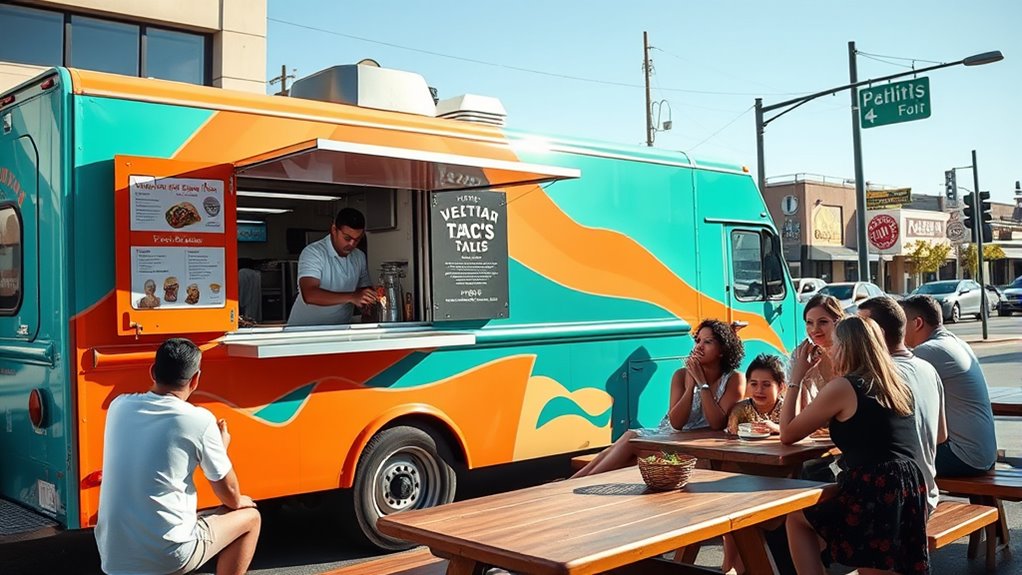
Stockton’s food scene bursts with energy and diversity, offering a vibrant mix of flavors that reflect its multicultural community. To master this scene, focus on maintaining high standards of food safety and securing proper vendor licensing. These are essential to building trust with customers and standing out among local competitors. As you explore Stockton’s culinary landscape, consider:
Stockton’s vibrant food scene thrives on diversity, safety, and strong vendor relationships.
- Connecting with established vendors to learn best practices
- Participating in local food festivals to gain exposure
- Collaborating with community events to boost visibility
Understanding the local market’s preferences helps you craft unique offerings. Keep safety protocols strict, ensuring your food meets all health standards. With the right licensing, you’ll be poised to become a recognized part of Stockton’s lively food scene, attracting loyal customers enthusiastic to try your innovative creations.
Frequently Asked Questions
What Permits Are Needed for Outdoor Food Service in Stockton?
You’ll need to obtain food truck licensing and outdoor dining permits to serve food outdoors in Stockton. Start by applying through the Stockton Environmental Health Department for your food truck license, making certain your vehicle meets health standards. Then, get outdoor dining permits from the city’s planning or zoning department, especially if you plan to set up on sidewalks or parking spaces. These permits ensure you’re compliant with local regulations and can operate smoothly.
How Do I Choose the Best Location for My Food Truck?
You should pick a location with high foot traffic to attract more customers. Conduct a competitor analysis to see where other food trucks or eateries are thriving, and find gaps you can fill. Look for spots near busy parks, events, or workplaces. Test different locations to see which draws the most people, and stay flexible to adapt based on customer flow and competition.
Are There Specific Health Codes Unique to Stockton’s Food Industry?
Yes, Stockton has specific health codes you need to follow. You’ll need to pass local health inspections and adhere to food safety regulations set by the San Joaquin County Environmental Health Division. These include proper food handling, sanitation standards, and truck cleanliness. Make sure to regularly check for updates on local health codes, and keep your truck compliant to avoid fines or closures. Staying informed helps ensure your food truck operates smoothly and safely.
What Are Common Challenges Faced by Food Truck Owners in Stockton?
You’ll face common challenges like maneuvering parking regulations and maintaining your equipment. Ensuring you park legally and secure permits is essential to avoid fines. Regular equipment maintenance keeps your truck running smoothly and prevents costly breakdowns. Balancing these logistics with serving quality food can be tough, but staying organized and informed about local rules helps you succeed. Focus on compliance and maintenance, and you’ll build a strong, thriving food truck business in Stockton.
How Can I Build Partnerships With Local Stockton Businesses?
You can forge strong partnerships by actively engaging in community networking events and supporting local causes. Reach out to Stockton businesses with personalized proposals, highlighting mutual benefits like increased visibility through local sponsorships. Attend neighborhood gatherings, farmers markets, and business mixers to build genuine relationships. Offer collaborations such as catering or joint promotions. Consistent presence and genuine interest foster trust, making local businesses enthusiastic to partner and grow together in Stockton’s vibrant community.
Conclusion
Starting a food truck in Stockton means understanding the local scene, meeting requirements, designing your menu, managing your operations, and marketing effectively. It’s about becoming part of the community, serving delicious food, and building your brand. Stay committed, stay creative, and stay engaged. With passion, planning, and persistence, you’ll not only serve great meals but also grow your presence and thrive in Stockton’s vibrant food scene. Your food truck journey starts now—make it unforgettable.
